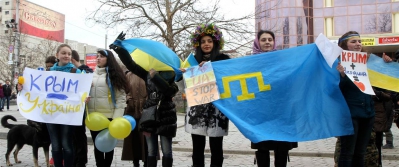Russia backtracks over Ukrainian citizenship in Crimea
 Photo: Simferopol, soon after the so-called March 16, 2014 referendum [Ed Flanaghan, NBS]
Photo: Simferopol, soon after the so-called March 16, 2014 referendum [Ed Flanaghan, NBS]
It seems that Crimeans were not in a hurry to renounce their Ukrainian citizenship. Faced with the prospect of embarrassing queues from Jan 1, 2016 when Crimeans will have 60 days to inform of dual citizenship or face criminal liability, Russia has made a complete turnaround Although the relevant law was adopted after Russia’s annexation of Crimea and was widely believed to be linked with it, the Russian Federal Migration Service [FMS] has now said that it does not apply to Ukrainian citizens in Crimea.
A formal announcement was posted in the second half of October, stating that “Crimeans recognized as Russian nationals according to the Agreement between Russia and the Republic of Crimea do not need to inform the FMS about their Ukrainian citizenship. Crimeans must inform of dual citizenship if they are or plan to become nationals of another country, the US or Germany, for example, or if they gained Ukrainian citizenship after the above-mentioned Agreement is considered to have come into force.
This seems to be a total turnaround for the Russian authorities and probably indicates the failure of previous efforts to convince Crimeans to formally renounce Ukrainian citizenship and take on Russian.
The agreement which FMS cites was between Moscow and the regime it installed when Russian soldiers seized control at the end of February 2014. Neither it, nor Russia’s annexation, are internationally recognized and a UN General Assembly Resolution from March 27, 2014, calls on countries to not recognize any change in Crimea’s status.
A one month period was allowed, from March 18 to April 18 for Ukrainians to formally register their wish to retain Ukrainian citizenship.
Attempts later to deny political prisoners Oleg Sentsov and Oleksandr Kolchenko their Ukrainian citizenship specifically referred to the fact that they had not formally declared that they were remaining Ukrainian citizens. Very few people did, but almost certainly because they were required to turn up in person, with only three or four offices provided throughout Crimea. There was also very little publicity about the requirement and many would have objected on principle to having to ‘apply’ to retain what was their fundamental right. An application has been lodged with the European Court of Human Rights over the refusal to accept Kolchenko’s Ukrainian citizenship.
A later Russian government directive from July 19 established a quota for non-Russian residents of the Crimea (Ukrainian citizens or nationals of other countries) to receive Russian Federation temporary residence permits. Five thousand could receive such ‘permits’ for the whole of Crimea, and a further 400 for Sevastopol. According to information issued on a federal migration service site, people living in the Crimea on March 18 2014 who formally declared their wish to retain their Ukrainian citizenship had the right to receive a residence permit for Russia.
The Russian authorities made exaggerated claims about the number of people who had received Russian citizenship and people were certainly placed under pressure to become Russian nationals. Over the first year after annexation, the Crimean Human Rights Field Mission reported widespread cases where people had been threatened with dismissal, told they couldn’t leave the Crimea without Russian citizenship or faced losing their right to land if they don’t become Russian nationals.
The Crimean Human Rights Group (which took over monitoring reports after Russia effectively criminalized as ‘undesirable’ the Crimean Human Rights Field Mission) has reported that a significant number of people were ‘automatically’ assigned Russian citizenship where they had not registered their wish to retain Ukrainian citizenship during the month given.
Some Crimeans, like Svetlana from Krasnoperekopsk, was unable to formally registered during the month given, but refused to take Russian citizenship. She applied for a residence permit [вид на жительство] but was turned down as she had been ‘automatically’ assigned Russian citizenship. She has been trying to get rid of this unsolicited Russian citizenship for the last year.
Russia’s new position also raises a number of questions about the Crimean Tatars who have been ‘deported’, like Sinaver Kadyrov, or banned from their homeland while it remains under Russian occupation like Mustafa Dzhemiliev and Refat Chubarov.
Considering the pressure and threats placed on Crimeans for not wanting Russian citizenship, and the constant claims that it was Crimeans who “chose to join Russia”, this is a telling climb-down.





